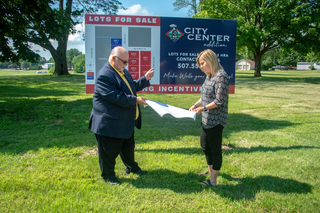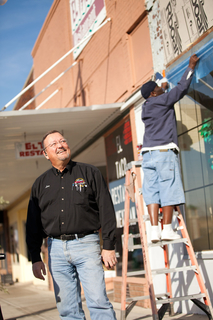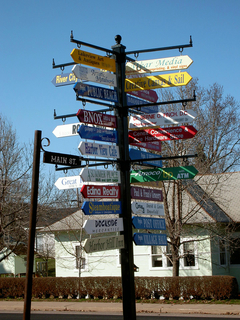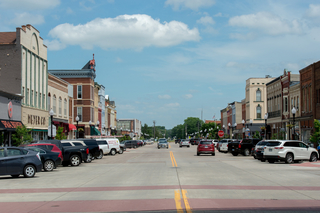University of Minnesota Extension offers free quarterly webinars featuring research and innovation in business retention and expansion (BRE) professional practice.
These webinars are open to everyone interested in economic development.
Webinar schedule
Please check back for information on upcoming webinars.
Past webinars
If you miss a live webinar, a link to the recording will be made available. You do not need to register. We appreciate you filling out the short evaluation form. See below for a list of available webinars.
Communities across Minnesota are beginning to realize how critical it is to have successful business transitions within their local economies. According to the 2019 Business Owner Survey Report, only 48 percent of business owners were interested in selling their business to an unrelated third-party buyer while 39 percent were interested in selling to a child or family member.
The dynamics of family-owned businesses can be vastly different, particularly when it comes to passing along the reins to the next generation. This webinar focuses on resources that are available to family-owned firms and covers:
- Identifying key issues that stand in the way of successful family business transitions.
- Transitioning both the business leadership and ownership.
- Planning for the continuation of family values and wealth transition.
- Exploring other topics of interest to family businesses, local economic development professionals, and related service providers.
Presenters
Extension community economic educator John Bennett is joined by Jon Keimig, director of the University of St. Thomas Family Business Center.
Watch the webinar
This webinar is available on demand. Although you do not need to register, we appreciate you filling out the short evaluation form. View it using the below button.
Would a worker-owned cooperative be right for your small business or one in your community? Worker-owned co-ops are attracting significant interest as a means for job and service retention, community-based economic development, and wealth-building. While less familiar than Employee Stock Ownership Plans (the most common form of employee ownership), worker-owned co-ops are generally well suited for smaller businesses with 50 or fewer employees.
This webinar will discuss:
- Why worker-owned co-ops are a valuable tool in the economic development toolkit.
- The processes typically used to start or convert existing businesses to cooperative ownership.
Presenters:
- Michael Darger, University of Minnesota Extension, community economics specialist — Michael manages Extension’s business retention and expansion programs and served as the principal investigator for the Retaining Rural Businesses through Employee Ownership project in Wisconsin and Minnesota.
- Kevin Edberg, Cooperative Development Services, executive director — Kevin's work is focused on cooperative education, technical assistance, and the creation of supportive ecosystems to empower groups and communities as they address economic and social challenges through mutual action.
Join us to learn about the five stages of transition for business conversions to employee ownership. This event is designed for business owners, economic developers, business support professionals and workers interested in learning more about worker cooperatives.
A generation of American business owners is retiring, yet many lack a plan to transition their business to new ownership and leadership. According to the U.S. Census Bureau, in 2016, more than 110,000 Minnesota and Wisconsin businesses with employees were owned by people 55 years or older. If these businesses are not retained, local economies are threatened by a loss of jobs, income and quality of life. Rural communities are especially at risk because retaining home-grown businesses is the most practical approach for rural economic development.
Employee ownership, particularly in the form of worker cooperatives, offers a solution for some business transitions. Shifting to employee ownership can keep business doors open, save jobs and maintain the business as a valued part of the community — a triple-win solution for the owner, the employees and the community. Surprisingly, few companies take advantage of this option. There are fewer than 7,500 employee-owned companies in the U.S. (out of millions of employer firms). While most of these are Employee Stock Ownership Plans (ESOPs), worker cooperatives are a more viable and practical option for businesses with fewer than 100 employees.
Webinar presenters: Courtney Berner, of the University of Wisconsin Center for Cooperatives, will provide practical information, case studies and resource ideas. She will be joined by her colleague Esther West, as well as Kevin Edberg of Cooperative Development Services, and Michael Darger of University of Minnesota Extension.
Available on-demand
When you begin a community development project, you may often hear this question: "Why should we support your effort?" It will be important to show those interested or invested in the project the potential economic value it may bring to your community.
There are multiple economic tools to help explain the value of community development. Selecting the right tool can help you make the strongest argument. Also, understanding the pros and cons of each tool will help you get the most from your analysis. During our presentation, you will learn about the following economic tools:
- Economic impact analysis
- Feasibility studies
- Contingent valuation
- Cost-benefit analysis
Presenter: Brigid Tuck, senior economic analyst for University of Minnesota Extension
Available on-demand
This webinar is available on-demand. Although you do not need to register, we appreciate you filling out the short evaluation form. View it using the below button.
How does your community respond when local businesses need help getting started or staying open? For some rural communities, Community Supported Enterprises (CSE) — or local residents and organizations investing in businesses — help offer a solution. CSEs involve local people or groups motivated by a social purpose in the community — to provide access to services with significant community investment and engagement.
During our presentation, you will learn about examples of CSEs across the nation and in rural New England.
This webinar will feature research by Norman Walzer, senior research scholar for Northern Illinois University's Center for Governmental Studies.
Available on-demand
This webinar is available on-demand. Although you do not need to register, we appreciate you filling out the short evaluation form. View it using the below button.
Minnesota's consumer and retail economy is changing. In 2019, Extension studied retail sales from 47 cities across Minnesota. A key finding showed retail sales are shifting from Main Street to the Internet, catalog and phone sales. Despite this change in consumer spending, Extension found instances where a community started outpacing the pack and grew consumer sales.
During our presentation, you will learn:
- What factors made a difference in these communities.
- How these trends may affect your own community.
We will also have a discussion on national and Minnesota online sales trends.
Guest: Bruce Schwartau
About our guest: Bruce Schwartau is the University of Minnesota Extension program leader for community economics. He has studied retail trends in Minnesota for many years and developed the retail trade analysis program that many communities use to understand their local retail economy. He also has contributed to the Community Retail Development Toolbox that was co-created by University of Wisconsin, the Ohio State University, and University of Minnesota Extension.
Available on-demand
This webinar is available on-demand. Although you do not need to register, we appreciate you filling out the short evaluation form. View it using the below button.
Can data collected from business visits help you understand how perceptions of a community affect where a business decides to locate? How can a community take action using information discovered from business retention and expansion (BRE) initiatives? Join our webinar to explore these questions.
During our presentation, you will learn about:
- The relationship between perceptions of community attributes and the community overall as a place to do business.
- How Extension’s BRE benchmark database has helped communities determine their priority actions, based on survey data collected through business visits.
There will be time at the end of the webinar for questions and discussion.
Guests: Nich Tremper and Monica Haynes
About our guests: Nich Tremper examined BRE theory and analyzed data (2007-2015) from Extension's BRE program. Monica Haynes' team at the U of M Duluth helps communities understand their economic situation through business and economic data analysis.
Available on-demand
This webinar is available on-demand. Although you do not need to register, we appreciate you filling out the short evaluation form. View it using the below button.
Have you ever sent a survey and received too few responses or not the right data? If so, you are not alone. Most people dislike surveys. But surveys remain a very important way to collect information efficiently.
In this webinar, you will learn how to avoid making common mistakes when conducting community surveys. Topics include:
- Deciding what information you need from the survey
- Identifying who to target (e.g. businesses, residents or visitors).
- Selecting the right survey method (i.e. online, phone, mail or paper)
- Learning elements of good survey questions
- Understanding the basic principles of survey design
- Maximizing response rates through visual design and survey management
Intended audience: economic development professionals, local government officials, chamber leaders and members
Presenter: Scott Chazdon, Ph.D., former Extension research and evaluation specialist
Available on-demand
This webinar is available on-demand. Although you do not need to register, we appreciate you filling out the short evaluation form. View it using the below button.
What is the value of a downtown or business district with vibrant businesses? What do visitors and community members think about a town if there are a number of vacant properties?
Maintaining a thriving retail industry is important for communities of all sizes. In this webinar, you will learn about techniques and resources available to assess your community's retail situation and to take action.
Presenter: Ryan Pesch, Extension educator
Available on-demand
This webinar is available on-demand. Although you do not need to register, we appreciate you filling out the short evaluation form. View it using the below button.
A silver tsunami of baby-boomer retirements will sweep the nation in the coming years. In 2016, Extension studied how small rural communities will keep businesses as a massive generational transfer of ownership and leadership occurs.
Our research revealed success techniques and key issues for community economic development. We examined aspects of business succession or transition at a community level. Join us as we discuss this vital community topic.
Presenter: Liz Templin
Guest: Julie Keyes
Available on-demand
This webinar is available on-demand. Although you do not need to register, we appreciate you filling out the short evaluation form. View it using the below button.
In 2017, UMN Extension interviewed 23 economic development officials across Minnesota to learn about their professional practice of business retention and expansion (BRE). The in-depth interview data was compiled and analyzed using qualitative research methods.
In this webinar, you will learn about:
- Key research and findings from the study.
- Ontario's provincial BRE program and their use of BRE data to inform economic development.
Presenter: Michael Darger, Extension, business retention and expansion program director
Guest: Stephen Morris, Government of Ontario, economic development specialist
Available on-demand
This webinar is available on-demand. Although you do not need to register, we appreciate you filling out the short evaluation form. View it using the below button.
Join our community of practice
Become a member of the Minnesota BRE Community of Practice. Sign up to receive monthly emails with new research, updates and other tools to help you with your community work.










